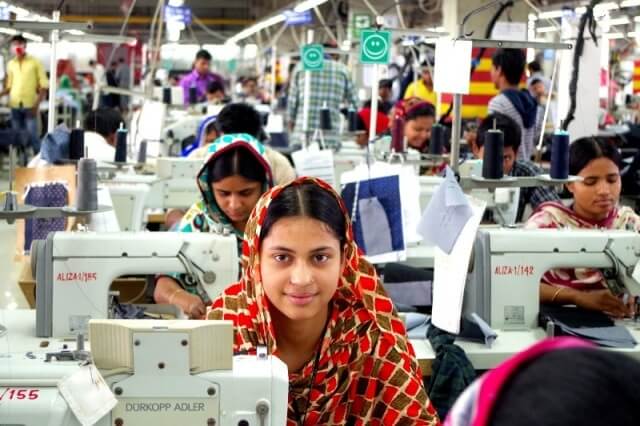The European Union (EU) may sanction a Euro (€) 90 million grant for one million Bangladeshi readymade garment (RMG) workers who have either been laid off or will permanently lose their jobs because of the COVID-19 pandemic.
Each of the 10 lakh workers will get cash support of Taka 3,000 for three months in the first phase – from June to August – when export orders in Bangladeshi factories might fall further due to a demand shrinkage in western markets.
The grant is likely to be extended for a second three-month phase afterwards.
“We are in discussions and hope things will be settled shortly,” said Dr Gauranga Chandra Mohanta, additional secretary and the Europe wing chief of the Economic Relations Division.
BKMEA Director Fazlee Shamim Ehsan, who also attended those discussions, said the total size of the grant could be further increased to Euro (€) 500 million.
Leaders of the Bangladesh Garment Manufacturers and Exporters Association (BGMEA) and the Bangladesh Knitwear Manufacturers and Exporters Association (BKMEA), and workers’ representatives also confirmed the news.
In April, the EU announced a Euro (€) 5 million cash support to garment workers in Myanmar.
If the EU gives Taka 3,000 each to 10 lakh workers, the amount will be Taka 300 crore a month and Taka 900 crore in three months. As per discussions, apparel makers have agreed to share the workers’ database with the EU team to identify those losing their jobs.
The cash will be deposited in the mobile banking accounts of the jobless workers.
The EU’s Bangladesh office has already conducted several meetings with labour representatives, the BGMEA and the BKMEA.
Sources said after the outbreak of the pandemic, the European Union planned to pay the affected RMG workers from May to September.
But apparel exporters suggested shifting the plan to the July-December period as the government had taken initiatives to pay RMG workers with its Taka 5,000 crore stimulus package at the time.
“We have discussed the payment issue with the EU team. They want to pay the workers who have already been laid off or will lose their jobs during the pandemic,” said BKMEA Director Fazlee Shamim Ehsan.
According to the BGMEA, over a thousand garment factories have suffered about US$ 2.97 billion worth of order cancellations and withdrawals by international brands and retailers. This loss could leave over a million RMG workers jobless.
“As the COVID-19 crisis unfolds, we all have realised that we need an unemployment scheme for the workers. Everyone needs to come up with a collaborative plan to support the workers who will, most unfortunately, lose their jobs,” said Rubana Huq, president of the BGMEA.
The impact of COVID-19 will go on till at least Spring 2021 as shoppers will buy less, she added.
“Therefore, the revised business landscape will require help and support from the government and the understanding of all concerned.”
With capacity reduction at 50 percent across the industry, the factories will continue to resize and reconstruct, said Rubana.
For this, a collective government to government (G2G) initiative involving all sourcing countries must begin, she added.
Labour leaders said many garment factories have been terminating workers claiming that they did not have work orders.
Factory owners terminated workers under several sections of the labour law, such as sections 12, 16 and 20, showing that they have no available work orders, said Nazma Akhter, president of the Sommilito Garments Sramik Federation.
“Since the end of Eid vacation, I have received many calls every day from fired workers,” she said.
She also urged other buying countries to pay workers during the pandemic, as all buyers and brands have a responsibility for them, she said.
According to industry sources, 419 RMG factories have already shut down due to a lack of orders and cancellations by international brands and retailers.
Industry people said some of them went for permanent closure because of the pandemic.

Like!! I blog frequently and I really thank you for your content. The article has truly peaked my interest.